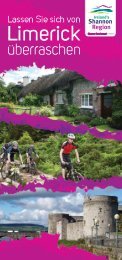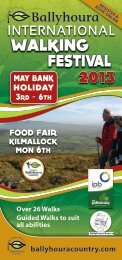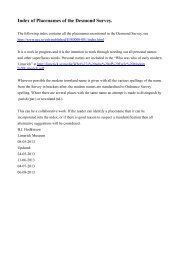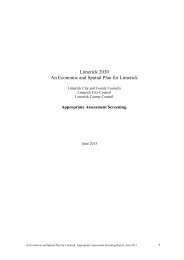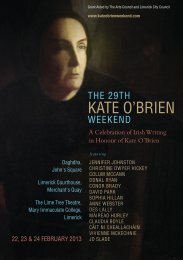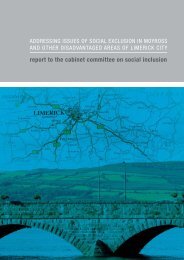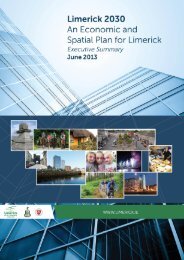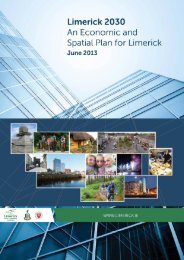An Economic and Spatial Plan for Limerick Appendices
An Economic and Spatial Plan for Limerick Appendices
An Economic and Spatial Plan for Limerick Appendices
Create successful ePaper yourself
Turn your PDF publications into a flip-book with our unique Google optimized e-Paper software.
<strong>Limerick</strong> 2030 <strong>An</strong> <strong>Economic</strong> <strong>and</strong> <strong>Spatial</strong> <strong>Plan</strong> <strong>for</strong> <strong>Limerick</strong><br />
The University of <strong>Limerick</strong> offers courses at undergraduate <strong>and</strong> postgraduate level as well as a variety<br />
of research positions, courses <strong>for</strong> international students <strong>and</strong> continuing learning courses. At the<br />
undergraduate level courses are spread across six schools: Education; Art; Humanities & Social<br />
Science; Health Sciences; Engineering; <strong>and</strong> Science. Postgraduate courses focus on the four areas<br />
of: Art Humanities & Social Science; Education & Health Science; Business; <strong>and</strong> Science &<br />
Engineering.<br />
Continuing learning programmes include courses in: HR training <strong>and</strong> development; Training <strong>for</strong><br />
research students; Foreign <strong>and</strong> Irish language courses; <strong>and</strong> ULearning, which aims to address<br />
individual <strong>and</strong> corporate skills gaps through professional flexible learning provision.<br />
<strong>Limerick</strong> Institute of Technology also offers a range of courses <strong>for</strong> undergraduates, postgraduates,<br />
apprentice programmes, <strong>and</strong> lifelong learning/evening classes. Undergraduate courses are<br />
delivered in four schools: Art & Design; Built Environment; Business & Humanities; Science, Engineering<br />
& ICT.<br />
Postgraduate courses are delivered through eight schools: Applied Science; Art & Design; Built<br />
Environment Management; Business; Business, Education & Social Sciences; Electrical & Electronic<br />
Engineering; Humanities; In<strong>for</strong>mation Technology.<br />
In addition to undergraduate <strong>and</strong> postgraduate courses LIT offers a wide range of lifelong learning<br />
<strong>and</strong> evening classes in the subject areas of: Applied Science; Art & Design; Built Environment;<br />
Business; Education & Social Sciences; Electrical & Electronic Engineering; Humanities; In<strong>for</strong>mation<br />
Technology; Mechanical & Automobile Engineering; <strong>and</strong> Technology, Media & Science.<br />
Further to UL <strong>and</strong> LIT, Mary Immaculate College (MIC) is also located in <strong>Limerick</strong>. Whilst the main<br />
focus of the College is teacher training the College runs a host of initiatives aimed at overcoming<br />
educational disadvantage in the wider community <strong>and</strong> enhancing the participation of under-<br />
represented groups in educational programmes. Through the Targeting Educational Disadvantage<br />
Project (TED), Mary Immaculate College supports two networks of primary schools that have been<br />
designated disadvantaged by the Department of Education & Science. The project facilitates<br />
sharing of good practice in tackling issues such as absenteeism, behaviour, progression <strong>and</strong><br />
exclusion.<br />
A second programme run by the College is the Curriculum Development Unit (CDU), which is a<br />
dedicated Centre <strong>for</strong> Educational Disadvantage Research. The CDU undertakes research into the<br />
curriculum <strong>and</strong> methodology of the primary school <strong>and</strong> has developed a variety of resources<br />
designed to address different <strong>for</strong>ms of educational disadvantage.<br />
June 2013 28



